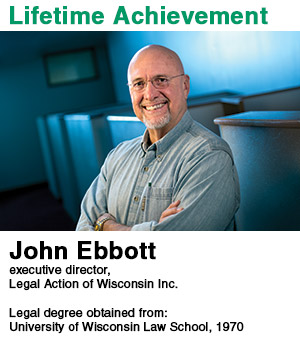Ebbott remains passionate for his cause
By: Eric Heisig//February 27, 2014//
 On the wall behind John Ebbott’s desk is a picture of him and Martin Luther King Jr., taken when the iconic figure was in Madison in the 1960s.
On the wall behind John Ebbott’s desk is a picture of him and Martin Luther King Jr., taken when the iconic figure was in Madison in the 1960s.
Ebbott, then a student at the University of Wisconsin, said King — as well as the tenor of the era — did a lot to inform how he thinks today, and pushed him toward a career helping poor people find legal representation.
“I was a conservative Republican my first two years of college there,” Ebbott said, describing his move into progressive politics. “But it was in the middle of the anti-Vietnam War activism and the middle of the Civil Rights Movement.”
Now, after 24 years as executive director of Legal Action of Wisconsin Inc., he plans to step down in June. In his time overseeing the nonprofit — which serves 39 counties in Wisconsin — Ebbott has positioned himself as a giant in the small legal community dedicated to helping indigent clients.
“Throughout the time I’ve known him,” Milwaukee County Circuit Judge Mary Triggiano, who worked for Legal Action before taking the bench, said, “he has really pursued access to justice in different ways.”
As Ebbott’s time with Legal Action comes to a close, a number of projects he has worked on — including a second attempt to try a civil Gideon program in Wisconsin — remain unfinished.
“People keep thinking the needs have changed,” he said. “But people still keep getting evicted, are still losing their kids, they’re still getting their cars repossessed.”
But he said he is confident that someone else will carry on the cause and is quick to point out the many attorneys and staff members that keep Legal Action afloat.
Still, he said, Legal Action “isn’t going to be easy to give up.”
Ebbott, who has been with the organization for the better part of 44 years, said he plans to use his retirement to write a book on Legal Action’s history, as well as work on a novel about Chief Black Hawk.
He started his career in 1970 as a staff attorney at Freedom Through Equality Inc., a law reform legal services firm in Milwaukee. That firm later merged with Milwaukee Legal Services to form Legal Action.
Ebbott later spent time as litigation director for the Migrant Legal Action Project in Washington, D.C.
As he tells stories about his work in the 1970s — from protecting welfare recipients during a protest of Boston Store to arguing for inmates’ rights — Ebbott refers to those as the “golden days.” But he said he is still as fired up now as he was back then; maybe even more so.
“When my colleagues and I began this work in the late ‘60s and early ‘70s, we thought that we would be able to use the law as a critical force in the larger movement to eliminate poverty in the country and to secure equal justice under law,” he said in an emailed follow-up to an interview. “Now, more people than ever are poor, and there is a larger income and wealth gap than ever, so we were not successful in achieving these goals.”
Ebbott knows he is leaving at a time where the need for indigent representation is far from being met. There also is an ongoing debate creating factions that favor attorneys for everybody — albeit in a limited manner — and those who believe in quality representation for as many as possible.
Ebbott is firmly in the latter camp. And that mindset has not changed much in 44 years.
“When rich people go to Foley [& Lardner LLP], they expect the lawyer to take their case and represent them,” Ebbott said. “They don’t want to be the lawyer … that’s what I wanted to do at Legal Action.”
Legal News
- Some State Bar diversity participants walk away from program
- Wisconsin court issues arrest warrant ‘in error’ for Minocqua Brewing owner
- Iranian nationals charged cyber campaign targeting U.S. Companies
- Facing mostly white juries, are Milwaukee County defendants of color truly judged by their peers?
- Milwaukee Mayor speaks in D.C. Tuesday at White House water summit
- Chicago man sentenced to prison after being caught with ‘Trump Gun’
- FTC bans non-competes
- Gov. Evers seeks applicants for Dane County Circuit Court
- Milwaukee man charged in dismemberment death pleads not guilty
- Democratic-led states lead ban on the book ban
- UW Madison Professor: America’s child care crisis is holding back moms without college degrees
- History made in Trump New York trial opening statements
WLJ People
- Power 30 Personal Injury Attorneys – Russell Nicolet
- Power 30 Personal Injury Attorneys – Benjamin Nicolet
- Power 30 Personal Injury Attorneys – Dustin T. Woehl
- Power 30 Personal Injury Attorneys – Katherine Metzger
- Power 30 Personal Injury Attorneys – Joseph Ryan
- Power 30 Personal Injury Attorneys – James M. Ryan
- Power 30 Personal Injury Attorneys – Dana Wachs
- Power 30 Personal Injury Attorneys – Mark L. Thomsen
- Power 30 Personal Injury Attorneys – Matthew Lein
- Power 30 Personal Injury Attorneys – Jeffrey A. Pitman
- Power 30 Personal Injury Attorneys – William Pemberton
- Power 30 Personal Injury Attorneys – Howard S. Sicula











